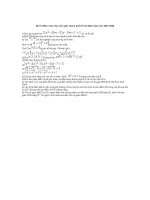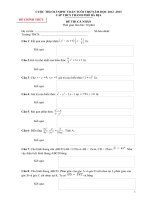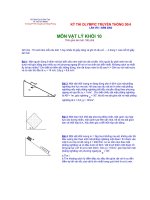Đề thi Olympic Toán học APMOPS năm 2002
Bạn đang xem bản rút gọn của tài liệu. Xem và tải ngay bản đầy đủ của tài liệu tại đây (370.16 KB, 14 trang )
<span class='text_page_counter'>(1)</span><div class='page_container' data-page=1>
<b>Saturday, 27 April 2002</b>
<b> </b>
<b>0900 h — 1100 h</b>
<b>The Chinese High School</b>
<b>Mathematics Learning And Research Centre</b>
SMOPSSMOPSSMOPSSMOPSSMOPSSMOPSSMOPSSMOPSSMOPSSMOPSSMOPSSMOPSSMOPSSMOPSSMOPSSMOPSSMOPSSMOPSSMOPSSMOPSSMOPSSMOPSSMOPSSMOPSSMOPSSMOPSSMOPSSMOPSSMOPSSMOPS
SMOPSSMOPSSMOPSSMOPSSMOPSSMOPSSMOPSSMOPSSMOPSSMOPSSMOPSSMOPSSMOPSSMOPSSMOPSSMOPSSMOPSSMOPSSMOPSSMOPSSMOPSSMOPSSMOPSSMOPSSMOPSSMOPSSMOPSSMOPSSMOPSSMOPS
<b>Asia Pacific Mathematical Olympiad</b>
<b>for Primary Schools 2002</b>
<b>First Round</b>
<b>2 hours</b>
<b>(150 marks )</b>
<i><b>Instructions to Participants</b></i>
Attempt as many questions as you can.
Neither mathematical tables nor calculators may be used.
Write your answers in the answer boxes.
<b>Marks are awarded for correct answers only.</b>
<b>This question paper consists of </b>
<b>4</b>
<b> printed pages ( including this page )</b>
<i>Number of correct answers for Q1 to Q10 : </i>
<b> Marks ( ´ 4 ) : </b>
<i><b>Number of correct answers for Q11 to Q20 : Marks ( ´ 5 ) : </b></i>
<i><b>Number of correct answers for Q20 to Q30 : Marks ( ´ 6 ) : </b></i>
1. How many numbers are there in the following number sequence ?
1.11, 1.12, 1.13, . . . , 9.98, 9.99.
2. What is the missing number in the following number sequence ?
3. Observe the pattern and find the
<i> value of a.</i>
</div>
<span class='text_page_counter'>(2)</span><div class='page_container' data-page=2>
2/22/11 2:31 AM
APMOPS 2002 First Round Questions
Page 2 of 4
/>
.
5. The average of 10 consecutive odd numbers is 100.
What is the greatest number among the 10 numbers ?
6. What fraction of the figure is shaded , when
each side of the triangle is divided into 3
equal parts by the points?
7. The figure is made up of two squares of sides 5
cm and 4 cm respectively. Find the shaded area.
8. Find the area of the shaded figure. 9. Draw a straight line through the point A to
divide the 9 circles into two parts of equal areas.
10 <i>In the figure, AB = AC = AD, </i> and
.
Find .
11. In the sum, each represents a non-zero digit.
What is the sum of all the 6 missing digits ?
12. <i>The average of n whole numbers is 80. One of the numbers is 100. After removing the number 100, the average of the</i>
<i>remaining numbers is 78. Find the value of n .</i>
13. The list price of an article is $6000. If it is sold at half price, the profit is 25%. At what price must it be sold so that the
profit will be 50% ?
14. of a group of pupils score A for Mathematics; of the pupils score B; of the pupils score C; and the rest
score D.
If a total of 100 pupils score A or B, how many pupils score D ?
15. At 8.00 a.m., car A leaves Town P and travels along an expressway. After some time, car B leaves Town P and
travels along the same expressway. The two cars meet at 9.00 a.m. If the ratio of A’s speed to B’s speed is 4 : 5 , what
time does B leave Town P ?
16.
Which one of the following is the missing figure ?
</div>
<span class='text_page_counter'>(3)</span><div class='page_container' data-page=3>
2/22/11 2:31 AM
APMOPS 2002 First Round Questions
Page 3 of 4
/>
of the original rectangle. If the area of the
shaded triangle is , find the area of
the original rectangle.
18. The square, ABCD is made up of 4 triangles and
2 smaller squares.
Find the total area of the square ABCD.
19. The diagram shows two squares A and
B inside a bigger square.
Find the ratio of the area of A to the
area of B.
20. There are 3 straight lines and 2 circles on the plane. They divide the plane into regions. Find the greatest possible
number of regions.
21. The number 20022002 . . . 20022002 is formed by writing 2002 blocks of ‘2002’.
Find the remainder when the number is divided by 9.
22. Find the sum of the first 100 numbers in the following number sequence .
1, 2, 3, 4, 5, 6, 7, 8, 9, 1, 0, 1, 1, 1, 2, 1, 3, 1, 4, 1, 5, . . .
23. In a number sequence : 1, 1, 2, 3, 5, 8, 13, 21, . . . , starting from the third number, each number is the
sum of the two numbers that come just before it.
<b>How many even numbers are there among the first 1000 numbers in the number sequence ?</b>
24 10 years ago, the ratio of John’s age to Peter’s age was 5 : 2.
The ratio is 5 : 3 now. What will be the ratio 10 years later ?
25. David had $100 more than Allen at first. After David’s money had decreased by $120 and Allen’s money had
increased by $200, Allen had 3 times as much money as David.
What was the total amount of money they had at first ?
26. Two barrels X and Y contained different amounts of oil at first.
Some oil from X was poured to Y so that the amount of oil in Y was doubled. Then, some oil from Y was
poured to X so that the amount of oil in X was doubled
After these two pourings, the barrels each contained 18 litres of oil. How many litres of oil were in X at first ?
27. In the figure, each circle is to be coloured by one of the
colours : red, yellow and blue.
In how many ways can we colour the 8 circles such that
any two circles which are joined by a straight line have
different colours ?
28. The points A, B, C, D, E and F are on the two straight lines
as shown.
How many triangles can be formed with any 3 of
the 6 points as vertices ?
29. Patrick had a sum of money.
On the first day, he spent of his money and donated $30 to charity.
On the second day, he spent of the money he still had and donated $20 to charity.
On the third day, he spent of the money he still had and donated $10 to charity.
At the end, he had $10 left. How much money did he have at first ?
</div>
<span class='text_page_counter'>(4)</span><div class='page_container' data-page=4>
2/22/11 2:31 AM
APMOPS 2002 First Round Questions
Page 4 of 4
/>
The winner of each match scores 3 points; the loser scores 0 points; and if a match is a draw, each team
scores 1 point.
After all the matches, the results are as follows :
(1) The total scores of 3 matches for the four teams are consecutive odd numbers.
(2) D has the highest total score.
(3) A has exactly 2 draws, one of which is the match with C.
Find the total score for each team..
</div>
<span class='text_page_counter'>(5)</span><div class='page_container' data-page=5>
<b>Name of Participant : Index No : / </b>
<b>( Statutory Name ) </b>
<b>Name of School : </b>
<b>Singapore Mathematical Olympiad for Primary Schools 2002 </b>
First Round
– Answers Sheet
Answers
For
markers use
only
Answers
For
markers use
only
1
889
16 C
2
1/90
17 48 cm²
3
77
18 900 cm²
4
1000 ½
19 8 : 9
5
109
20 21
6
1/3
Questions 11 to 20
each carries 5 marks
7
8 cm²
21 7
8
6 cm²
22 365
9
Line must
pass through
the centre of
the middle
circle.
23 333
24 10 : 7
</div>
<span class='text_page_counter'>(6)</span><div class='page_container' data-page=6>
Questions 1 to 10
each carries 4 marks
26 22.5 l
11
36
27 18
12
11
28 18
13
$3600
29
$160<sub> </sub>
14
5
30
A : 5 B : 3 <sub>C : 1 D : 7</sub>All correct –
6m
3 correct –
2m
Others – 0m
15
8.12a.m.
Questions 21 to 30
each carries 6 marks
</div>
<span class='text_page_counter'>(7)</span><div class='page_container' data-page=7>
<b>The Chinese High School </b>
<b>Mathematics Learning And Research Centre </b>
SMOPSSMOPSSMOPSSMOPSSMOPSSMOPSSMOPSSMOPSSMOPSSMOPSSMOPSSMOPSSMOPSSMOPSSMOPSSMOPSSMOPSSM
OPSSMOPSSMOPSSMOPSSMOPSSMOPSSMOPSSMOPSSMOPSSMOPSSMOPSSMOPSSMOPS
SMOPSSMOPSSMOPSSMOPSSMOPSSMOPSSMOPSSMOPSSMOPSSMOPSSMOPSSMOPSSMOPSSMOPSSMOPSSMOPSSMOPSSM
OPSSMOPSSMOPSSMOPSSMOPSSMOPSSMOPSSMOPSSMOPSSMOPSSMOPSSMOPSSMOPS
<b>Asia Pacific Mathematical Olympiad</b>
<b>for Primary Schools 2002</b>
<b>Invitation Round</b>
<b>2 hours</b>
<b>(60 marks )</b>
<i><b>Instructions to Participants</b></i>
Attempt as many questions as you can.
Neither mathematical tables nor calculators may be used.
<i><b>Working must be clearly shown in the space below each question. </b></i>
<i>Marks are awarded for both method and answer.</i>
Each question carries 10 marks.
<b>This question paper consists of </b>
<b>7</b>
<b> printed pages ( including this page ) </b>
<b>Question </b>
<b>1 </b>
<b>2 </b>
<b>3 </b>
<b>4 </b>
<b>5 </b>
<b>6 </b>
<b>Marks </b>
<b> </b>
<b> </b>
<b> </b>
<b> </b>
<b> </b>
<b> </b>
</div>
<span class='text_page_counter'>(8)</span><div class='page_container' data-page=8>
<b>1.</b>
The following is an incomplete 9 by 9 multiplication table.
1
2
3
4
5
6
7
8
9
1
:
:
2
:
:
3
:
:
4
16
:
5
35
6
7
8
9
(a) Find out how many of the 81 products are odd numbers .
(b) If the multiplication table is extended up to 99 by 99, how many of
the products are odd numbers ?
</div>
<span class='text_page_counter'>(9)</span><div class='page_container' data-page=9>
<b>2.</b>
Find the area of each of the following shaded regions.
The shaded 4-sided figures above have been drawn with the four
vertices at the dots, on each side of the square.
In the same manner,
(i)
<b>draw a 4-sided figure with the greatest possible area in (D), </b>
(ii)
draw a 4-sided figure with the smallest possible area in
<b>(E). </b>
<i> </i>
<i> </i>
<i> </i>
</div>
<span class='text_page_counter'>(10)</span><div class='page_container' data-page=10>
<b>4. There are two identical bottles A and B. </b>
A contains bottle of pure honey.
B contains a full bottle of water.
First pour the water from B to fill up A and mix the content completely ;
then pour the mixture from A to fill up B and mix the content completely.
(i)
What is the ratio of honey to water in B after the two pourings ?
(ii)
If this process of pouring from A to B , and then from B to A, is
repeated for another time, what will be the ratio of honey to water in B ?
(iii)
If this process of pouring is repeated indefinitely, what will be the ratio
of honey to water in B ?
</div>
<span class='text_page_counter'>(11)</span><div class='page_container' data-page=11>
5.
A right-angled triangle (1) is placed with one side lying along a straight line.
It is rotated about point A into position (2).
It is then rotated about point B into position (3).
Finally, it is rotated about point C into position (4).
Given that AP = BP = CP = 10 cm, find the total length of the path traced out
by point P. ( Take
. )
6.
Figure 1 shows a street network where
<i>A, B, …, I are junctions. We observe </i>
that it takes at most 4 steps to travel from one junction to another junction.
<i>e.g. From A to I, we may take the following 4 steps. </i>
The street network is now converted to a one-way traffic system as shown in
Figure 2. In this one-way traffic system, it takes at most 6 steps to travel from
one junction to another junction.
<i>e.g. From A to I, we may take the following 6 steps . </i>
</div>
<span class='text_page_counter'>(12)</span><div class='page_container' data-page=12>
<b>In Figure 3, design a one-way traffic system so that it takes at most 5 steps to </b>
travel between any two junctions.
</div>
<span class='text_page_counter'>(13)</span><div class='page_container' data-page=13>
<b>Singapore Mathematical Olympiad for Primary Schools 2002 </b>
Invitation Round
– Answers Sheet
<b> </b>
<b> </b>
Question 1:
Ans: a) 25 b) 2500
Question 2:
Question 3:
Ans:
i) 5
thnumber: 55/89 6
thnumber: 144/233
ii) 2584/4181
iii) 6765/10946
Question 4:
Ans:
i)
<b> </b>1 : 3
ii)
<b> </b>5 : 11
iii)
<b> </b>1 : 2
Question 5:
Ans: 62.8cm
</div>
<span class='text_page_counter'>(14)</span><div class='page_container' data-page=14></div>
<!--links-->









